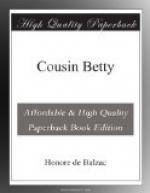Just when Cousin Betty, the best hand in the house of Pons Brothers, where she was forewoman of the embroidery department, might have set up in business on her own account, the Empire collapsed. The olive-branch of peace held out by the Bourbons did not reassure Lisbeth; she feared a diminution of this branch of trade, since henceforth there were to be but eighty-six Departments to plunder, instead of a hundred and thirty-three, to say nothing of the immense reduction of the army. Utterly scared by the ups and downs of industry, she refused the Baron’s offers of help, and he thought she must be mad. She confirmed this opinion by quarreling with Monsieur Rivet, who bought the business of Pons Brothers, and with whom the Baron wished to place her in partnership; she would be no more than a workwoman. Thus the Fischer family had relapsed into the precarious mediocrity from which Baron Hulot had raised it.
The three brothers Fischer, who had been ruined by the abdication at Fontainebleau, in despair joined the irregular troops in 1815. The eldest, Lisbeth’s father, was killed. Adeline’s father, sentenced to death by court-martial, fled to Germany, and died at Treves in 1820. Johann, the youngest, came to Paris, a petitioner to the queen of the family, who was said to dine off gold and silver plate, and never to be seen at a party but with diamonds in her hair as big as hazel-nuts, given to her by the Emperor.
Johann Fischer, then aged forty-three, obtained from Baron Hulot a capital of ten thousand francs with which to start a small business as forage-dealer at Versailles, under the patronage of the War Office, through the influence of the friends still in office, of the late Commissary-General.
These family catastrophes, Baron Hulot’s dismissal, and the knowledge that he was a mere cipher in that immense stir of men and interests and things which makes Paris at once a paradise and a hell, quite quelled Lisbeth Fischer. She gave up all idea of rivalry and comparison with her cousin after feeling her great superiority; but envy still lurked in her heart, like a plague-germ that may hatch and devastate a city if the fatal bale of wool is opened in which it is concealed.
Now and again, indeed, she said to herself:
“Adeline and I are the same flesh and blood, our fathers were brothers —and she is in a mansion, while I am in a garret.”
But every New Year Lisbeth had presents from the Baron and Baroness; the Baron, who was always good to her, paid for her firewood in the winter; old General Hulot had her to dinner once a week; and there was always a cover laid for her at her cousin’s table. They laughed at her no doubt, but they never were ashamed to own her. In short, they had made her independent in Paris, where she lived as she pleased.




